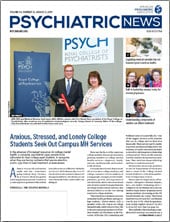As Mark Moran notes in his front page
article of June 7, 2019 (“Esketamine, Antidepressant Combo Safe, More Effective Than Placebo), evidence for safety and efficacy of ketamine appears to be mounting. Ketamine is being hailed in some circles as a “wonder drug.” Meanwhile, I am with increasing frequency having the unsettling experience of meeting patients with histories of severe, refractory depression, who improved with ketamine, who gradually lose that benefit, and eventually have serious suicide attempts. It is, of course, likely that a significant proportion of chronically suicidal patients will eventually have serious attempts, and no medications that we have can prevent this from happening. Nevertheless, as Moran points out, ketamine is an abusable drug, and we still know little of what long-term effects and response rates may turn out to be.
The history of psychiatry has numerous examples of substances hailed as low-risk cures, which only after tragic experience, are revealed to cause addiction and psychiatric morbidity. Freud, famously, was a proponent of cocaine, before he observed cocaine-induced addiction and insanity in a colleague. Heroin appeared at one point to be a safe substitute for morphine. Diazepam and alprazolam were viewed once as almost completely nonaddictive. We search for antidepressants that will alleviate suffering; addictive drugs actually accomplish this, often for many months before they fail. Long-term results of addiction are catastrophic, which has much to do with how gratifying the drugs are in the short term, how they replace other important life experiences, and the long-term neurochemical and psychological effects of relying on a drug for temporary happiness.
We still do not have data from long term studies and or understanding of the lived experience of ketamine use. When we read that patients experience “improvement in depression scores,” we react as though we are reading about a conventional antidepressant. When I hear that a patient is experiencing pleasurable, distracting hallucinations that help her to feel better and to stop thinking about suicide, I think I am hearing about something different from conventional antidepressant effects. Alan Schatzberg recently, in the May issue of the American Journal of Psychiatry, raised caution regarding effects of ketamine. Noting that relapse was a significant problem in one study with patients after 16 weeks of ketamine treatment, even with continued antidepressant use, Schatzberg raised the question of whether this is actually an effective treatment strategy. Even more worrisome, three suicides in this study were in the group that had received ketamine, raising a concern of possible withdrawal effects.
We don’t know much about the patient perspective of ketamine use, what it feels like to have a complex positive emotional experience that may include hallucinations, experience hope, and then experience the gradual wearing off of these effects. We don’t know what hopelessness may occur when a person has had an unusual, positive treatment experience, and then can’t recapture the same experience. We can try to learn more, and be careful about recommending what we don’t yet understand. ■
ELIZABETH WEINBERG, M.D.
Stockbridge, MA
